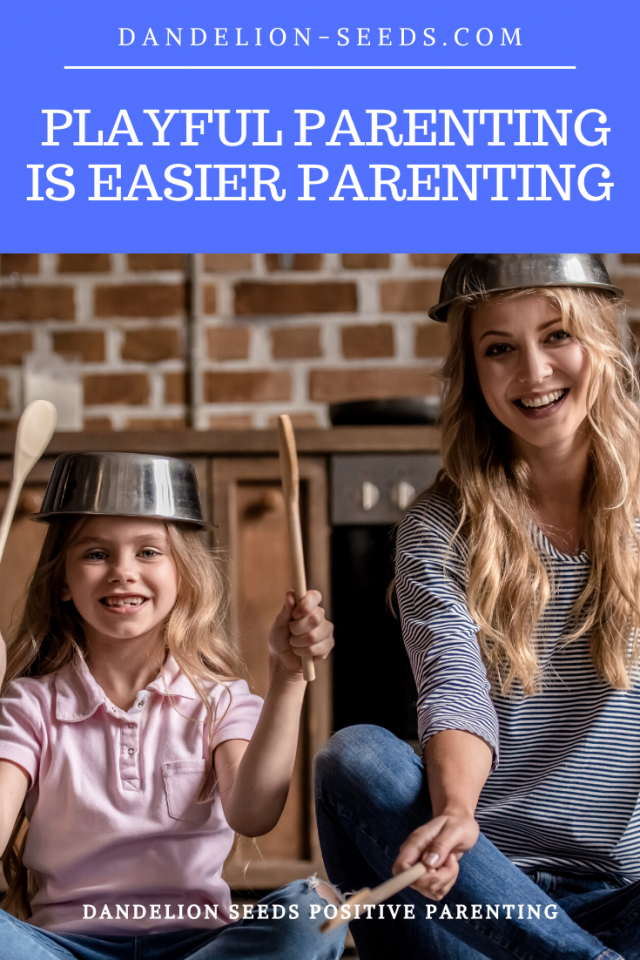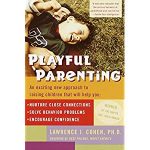
Sign in
Don't have an account with us? Sign up using the form below and get some free bonuses!

If "play is the work of childhood" (a quote by child psychologist Jean Piaget), then playful parenting is the best way we can work with our children. It's the absolute key to cooperation.
Children play "rain or shine"---it helps them decrease stress, learn new things, and figure out the world (source). Parents do well to remember that the time we invest playing not only helps us connect to our kids, but also makes our job as parents easier. I've never met a child who didn't love it when a parent brought a playful attitude and laughter to the relationship. It helps kids feel close and emotionally understood.
Playful parenting is all about connection.
We want to enjoy our interactions with our children. If we focus on "getting" them do things, the relationship becomes about power. Instead, I'd encourage parents to work alongside their children as partners against whatever problems they're trying to solve.
True, for our kids' well being, we need to set healthy boundaries—our influence is key in that. That's what positive parenting is all about; working with kids rather than against them. Being a playful parent signals to a child that we're on their side—we're in this together. We can connect and be close without power struggles.

How does it work, though, for adults who aren't as naturally playful as kids are? Our brains are wired quite differently from theirs! As we know, kids can have fun playing with parents, friends, and even cardboard boxes. (Fortunately, boxes are wonderful toys.)
The tips below work especially well for ages of 2 - 7, but versions of them can continue well beyond these years.
One fun way to accomplish this is to feign total incompetence. As you approach your child with her hairbrush, say, "Open wide! Time to brush your teeth!" Similarly, holding the toothbrush, say, "Oh, this will make your hair so fancy!" Your child will love the feeling of power and total competence as they point out the error of your ways. You, of course, will be shocked to learn your mistake. With exaggerated hesitation, you will try it their way for a moment. After a minute (especially if they start to protest), add, "That's right! I use this on your ARM! Arm, be still." Use your own arm if need be. It's okay to go back and forth a time or three to get it done.
Try to trust your child's timing here. If they need help remembering to check, however, make it fun. Maybe they're climbing onto a choo choo train. Perhaps it's a rocket that's about to blast off to a new solar system.
Do YOU, parent, fit into that 3T sweater? Please try. If your child isn't keen to get dressed, a bit of laughter clears the air and helps you connect. It's worth the time to slow down and be silly if it cancels the 45-minute tantrum that might otherwise ensue.
Another great way to accomplish getting your child ready for the day is to involve the stuffed animals. They're your allies. Can your child dress a doll while you're putting on his socks? Can your kiddo tell you what his animal friend needs to wear for his rainy day, and what he might need to do to match him? Get your kids outside their heads here. Involve them in care taking,
Cease talking about cleaning and all that "responsibility" rubbish (child view). Since this is a common trouble spot, I'll share several ideas. The key idea is this: Changing your nomenclature helps tremendously. Use kid terms. Not only enter, but lead, the world of make-believe.
When you see a bunch of toy cars all over the floor, notice the incredible traffic jam. The drivers need help getting back to their proper parking garage (the toy box)! "Drive" them back together. Sound effects help.
Building blocks have somehow scattered across the floor and need to make it back into the bag? No problem! You're not holding a bag; you're holding the HUNGRY MONSTER. "Feed me!" it bellows playfully. "Hungry! Must eat blocks! More! More!" On it goes until the mess is gone.
Get creative. If something doesn't have a logical "home" (like cars in a box you call a parking garage), make it silly. "Let's put all the dolls in the tree house [on the shelf] for the night!" Even a paper bag can be a "tent" for something. Bring toys and their storage spaces to life.
Lastly, remember how incompetent you were at brushing teeth and hair? You're even worse when it comes to picking up the toys! A ball? It weighs as much as a semi truck! How in the world can you lift it? Can someone save the day? (Many children love to rescue adults.) That giant toy elephant, however, is a breeze for you---it's light as a feather. Your superpowers are very confusing---and hilarious.
Although I often shy away from competition, this is the one time I'll offer a race. Who can put on shoes the fastest and touch the doorknob? For some kids (particularly highly sensitive ones), however, competition causes anxiety, so use it with caution.
Would anyone like to hop to the door like a bunny? Roll across the rug to get there? Be carried and spun in circles? Sometimes a different mode of transportation is all they need.
If your child can help put away non-breakable items from the dishwasher, for example, let them try. A great question to ask (even if they've done it before) is "Do you think you're strong enough to move these cups from the dishwasher to the counter?" Children love feeling competent. So much of their existence includes not knowing what to do, so when they feel capable, it's incredibly empowering for them.
This is involved parenting. This is parenting for connection. Sure, it might seem to take more time "in the moment," but ultimately, it can save your kiddo buckets full of tears and help you both feel like you're really in this together as a team. Because you are!
And, you might be surprised how willing children become to do tasks on their own after they've learned in an emotionally safe place with you---and they feel connected. It's a wonderful return on your investment. Long-term connections start when kids are little. Being a playful parent is a part of the equation that you can both enjoy.

